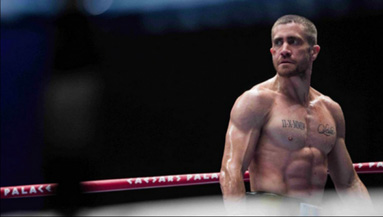Movie Review: Southpaw
By Matthew Huntley
August 3, 2015
It’s an ironic convention of Hollywood boxing movies that they’re so little about boxing. They feature boxing, sure, but they’re mostly about the people who box and the complex situations in their lives, which usually coincide with big boxing matches. But I’m not sure I can name one that has made me realize what it takes to box - outside of the obvious, such as being in supreme physical shape - or what it feels like to box. Even though the fight scenes are often well choreographed and convincing in these films, I’ve never found myself completely empathizing with the characters when they’re in ring, able to sense their pain and exhaustion. I’ve always felt more like a spectator.
Southpaw is the latest Hollywood boxing movie to adhere to this convention, which isn’t necessarily a bad one, especially because the non-boxing drama in this film, like many of its brethren, is raw, compelling and bolstered by very strong performances. These too are often the characteristics of boxing movies, from Rocky to Raging Bull, The Boxer to Million Dollar Baby. For some reason, boxing provides a strong platform and backdrop for involving, narrative storytelling. Perhaps a movie about what it actually feels like to box is better suited for a documentary.
In Southpaw, Jake Gyllenhaal plays Billy Hope, the current middleweight boxing champion whose last name gives the media plenty of opportunities for puns and plays on words, both in favor of and against him. After the film’s opening match, Billy is 43-0, although his latest victory underscores not only his age but also just how much physical pain the sport is now leaving him in. The next morning, he can barely move and wakes up spitting blood.
The toll boxing is taking on Billy is most apparent and concerning to his loving wife, Maureen (Rachel McAdams), who wants her husband to take a break, despite his manager, Jordan (Curtis "50 Cent” Jackson), insisting he sign up for another three-fight deal. Maureen not only fears for Billy’s safety and well-being but also wants the two of them to enjoy more time with their young daughter, Leila (Oona Laurence), whom Maureen won’t allow to watch the fights.
However, Billy, like Maureen, is an orphan out of Hell’s Kitchen, and his upbringing from this notoriously rough-and-tumble neighborhood has instilled in him a ferocious, relentless energy that only boxing seems to channel into something useful. That energy has also yielded Billy a temper and it’s often Maureen who must calm it. But when another pompous boxer, Miguel "Magic" Escobar (Miguel Gomez), who wants Billy’s title, starts shooting his mouth off and pushing Billy’s buttons at a charity event, the actions of both fighters leads to a tragedy, setting in motion Billy’s downward spiral of potentially losing everything near and dear to him - his mansion and luxury cars, his reputation, his friends, and above all, his family. Southpaw becomes the story of how Billy must start over and will himself from rock bottom in order to realize what really matters.
I haven’t given away too much with that last sentence because with a movie like this, its overall trajectory becomes apparent early on. In spite of this, Southpaw still makes for an effective sports drama and classic story of redemption. It’s traditional on both fronts, yes, but that doesn’t make it any less heartwarming and emotionally moving, and most of that is owed to the performances.
Gyllenhaal is exceptional as Billy. He reportedly gained 14 pounds of muscle mass for the role, which once again proves his range and gift for completely transforming into the character he plays. He makes Billy a multi-dimensional, complicated, interesting man who’s sometimes scary and sometimes lovable yet always sympathetic. It’s perhaps a weakness of Kurt Sutter’s screenplay that Billy’s transformation in the film happens too quickly and conveniently, but Gyllenhaal maintains a genuine performance throughout. It’s sort of amazing to think this is the same guy who played the lead roles in Donnie Darko, Brokeback Mountain and last year’s under-appreciated Nightcrawler, films whose main characters have almost most nothing in common, and yet Gyllenhaal still managed to own each of them and make them distinct.
The other key performance comes from Forest Whitaker as Tick Willis, the trainer with whom Billy signs up to get his life back in order. Willis, as a character, is archetypal, especially for a boxing movie. Of course he owns a rundown, seedy gym; of course he’s old school when it comes to training and hard work; and of course his life experiences have given him a vault of sage words and anecdotes that steer Billy in the right direction. But Whitaker’s delivery and incessant passion allow Willis to come across as original and unique so that when he speaks, we really listen to him.
It must also be noted that Laurence is quite remarkable as Billy’s daughter. She too creates a layered character and refrains from simply making Leila a cute victim. Instead, she’s an intelligent, strong-willed and expressive individual with real feelings.
Southpaw may live mostly within the confines of its genre and the material may be limited, but director Antoine Fuqua fleshes out the goods from it, mostly because he focuses so strongly on the people and allows his cast to really perform. Yes, it would have been nice if the screenplay was as rich, authentic and original as the performances that bring it to life, and if it had possessed a less traditional story arc that didn’t once again boil down to the “big match.” But in spite of these limitations, the very nature of the story and the acting help make Southpaw a worthy and hard-hitting drama.
|
|
|
|




